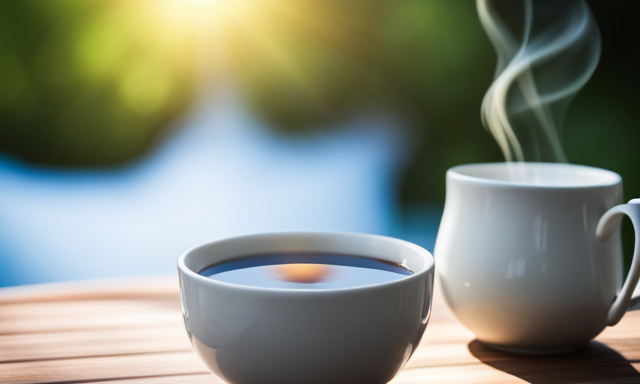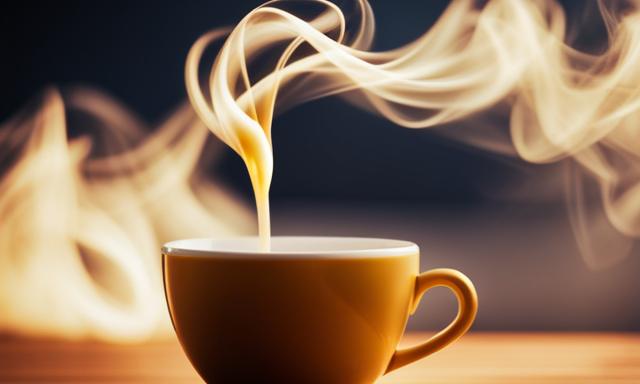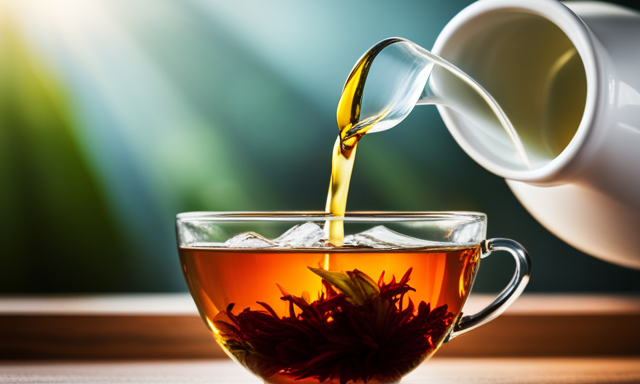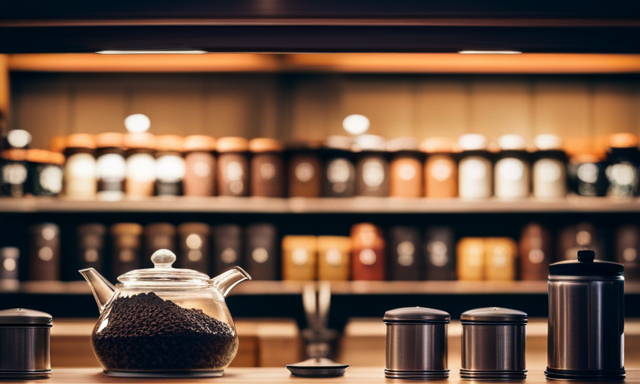As a tea enthusiast, I’ve always found that enjoying a cup of oolong tea is like finding a moment of tranquility in a chaotic world. The delicate aroma and smooth taste have a way of soothing my senses and allowing me to unwind.
However, one question that often arises is, ‘How late should I drink oolong tea?’ It’s a valid concern, considering the potential impact of caffeine on sleep quality. In this article, we will explore the fascinating world of oolong tea and its caffeine content, as well as the factors that influence its impact on sleep.
I’ll provide you with recommended timing for oolong tea consumption and tips for reducing its caffeine content. By listening to your body’s reactions and establishing a personalized tea drinking routine, you can strike the perfect balance between enjoying oolong tea and ensuring a good night’s sleep.
Remember, it’s all about finding harmony in every sip.
Key Takeaways
- Consulting a healthcare professional is important for personalized advice on oolong tea consumption, including tailored recommendations and assessing potential interactions with medications.
- Consider the caffeine content when choosing an oolong tea variety, as different teas have varying levels of caffeine. Lightly oxidized oolong teas tend to have lower caffeine levels, and it’s advisable to choose a variety with appropriate caffeine content, especially for those sensitive to caffeine.
- Manage caffeine intake throughout the day by limiting or avoiding other caffeinated beverages earlier in the day and planning oolong tea consumption later in the day. Balancing caffeine intake is crucial to prevent sleep disturbances and ensure a restful night’s sleep.
- Personalize your oolong tea drinking routine by experimenting with different times, paying attention to your body’s responses, and establishing a routine that works best for you. Tailoring your routine will allow you to enjoy oolong tea while still ensuring a good night’s sleep.
Understanding the Caffeine Content of Oolong Tea
If you’re wondering about the caffeine buzz from oolong tea, let’s dive into understanding its content!
Oolong tea contains varying levels of caffeine, depending on factors like the type of tea leaves used and the brewing time. On average, a cup of oolong tea contains about 30-50 milligrams of caffeine, which is less than black tea but more than green tea.
This moderate amount of caffeine can provide a gentle boost of energy without causing jitters or a crash. Moreover, oolong tea is known for its effects on weight loss due to its metabolism-boosting properties and the role of antioxidants in promoting fat oxidation.
However, it’s important to note that excessive consumption of caffeine, even from oolong tea, can affect sleep quality.
So, let’s explore the effects of caffeine on sleep in the next section.
The Effects of Caffeine on Sleep Quality
To ensure a better night’s sleep, it is important to be mindful of the impact caffeine has on sleep quality when consuming oolong tea. Caffeine, a natural stimulant found in oolong tea, can have various effects on the body, including its impact on sleep.
Consuming caffeine too close to bedtime can disrupt sleep quality by making it harder to fall asleep and reducing the overall amount of sleep obtained. This disruption can lead to daytime drowsiness and decreased productivity.
In addition to its effects on sleep, caffeine has been shown to affect athletic performance by improving endurance and reducing fatigue. However, it is worth noting that the effects of caffeine can vary from person to person. Factors such as metabolism and sensitivity to caffeine can influence its impact on sleep.
Understanding these factors will help in making informed decisions about when to consume oolong tea to ensure a good night’s rest.
Factors That Influence the Impact of Oolong Tea on Sleep
Ensure a restful night’s sleep by considering the various factors that can influence how oolong tea affects your ability to rest.
The impact of oolong tea on weight loss is one factor to consider. Oolong tea has been shown to increase metabolism and promote fat oxidation, which may contribute to weight loss efforts.
Additionally, oolong tea has been found to play a role in digestion. It can help stimulate the production of digestive enzymes, aiding in the breakdown of food and absorption of nutrients.
However, it’s important to note that oolong tea contains caffeine, which can interfere with sleep. To minimize the impact on sleep, consider the following:
- Limit consumption: Avoid drinking oolong tea in excessive amounts close to bedtime.
- Steep time: Keep steeping time shorter to reduce caffeine content.
- Personal tolerance: Be mindful of how your body reacts to caffeine and adjust accordingly.
Understanding these factors will help you make informed decisions about when to enjoy oolong tea and promote a good night’s sleep.
Transitioning into the next section, let’s explore the recommended timing for oolong tea consumption.
Recommended Timing for Oolong Tea Consumption
Optimal timing for enjoying oolong tea can help enhance its beneficial effects on sleep and overall well-being. When it comes to consuming oolong tea, it is important to consider the recommended brewing methods and the potential health benefits it offers.
To fully enjoy the potential benefits of oolong tea without disrupting your sleep, it is generally recommended to avoid consuming it too close to bedtime. The caffeine content in oolong tea can vary depending on the brewing method, but it is generally lower compared to other types of tea. However, it is still advisable to consume oolong tea earlier in the day to give your body enough time to process the caffeine. This way, you can fully experience the calming effects of oolong tea on your mind and body.
Transitioning into the subsequent section, there are also tips for reducing the caffeine content in oolong tea.
Tips for Reducing the Caffeine Content in Oolong Tea
If you’re looking to mellow out the caffeine in your cup of oolong tea, try steeping it for a shorter amount of time, like a tea bag taking a quick dip in a cool pool instead of a long soak. This can help reduce the caffeine content while still enjoying the rich flavors of oolong.
Here are some tips for reducing the caffeine content in your oolong tea:
- Opt for a lighter oolong tea variety, as they generally have lower caffeine levels.
- Brew your oolong tea at a lower temperature, as higher temperatures tend to extract more caffeine.
- Consider using loose leaf oolong tea instead of tea bags, as they often contain smaller tea leaves that may have less caffeine.
Reducing the caffeine content in your oolong tea can be a great option for evening relaxation. However, if you’re looking for an alternative herbal tea for a truly caffeine-free experience, let’s explore some options in the next section.
Alternative Herbal Teas for Evening Relaxation
When it comes to reducing the caffeine content in oolong tea, I have shared some helpful tips in my previous subtopic. However, if you’re looking for an alternative to oolong tea for evening relaxation, herbal tea blends can be a great option.
One such blend is chamomile tea, which is known for its soothing properties and ability to promote a sense of calmness. Chamomile tea is caffeine-free and has been used for centuries to aid in relaxation and improve sleep quality.
In addition to its calming effects, chamomile tea also offers various health benefits, such as reducing inflammation and boosting the immune system. So, if you’re looking to unwind in the evening, a cup of chamomile tea can be a wonderful choice.
Now, let’s delve into the next section and explore how to listen to your body’s reactions to oolong tea.
Listening to Your Body’s Reactions to Oolong Tea
So, let’s tune in to how our bodies respond to that delicious cup of oolong tea. When it comes to listening to our bodies’ reactions, mindfulness practices and listening techniques can be helpful. Here are three sub-lists to guide you in this process:
-
Pay attention to physical sensations:
- Notice how your body feels after drinking oolong tea.
- Do you feel energized or relaxed?
- Are there any changes in your digestion or sleep patterns?
-
Observe your mental state:
- Take note of your mood and mental clarity after consuming oolong tea.
- Do you feel more focused or calm?
- Are there any signs of anxiety or restlessness?
-
Consider the timing:
- Mindfully observe the time of day when you drink oolong tea.
- Does it affect your sleep if consumed too close to bedtime?
- Are there any patterns in how your body responds at different times?
By practicing these listening techniques and observing your body’s reactions, you can establish a personalized tea drinking routine that suits your individual needs and preferences.
Transitioning into the next section, let’s explore how to create a tea drinking routine that works best for you.
Establishing a Personalized Tea Drinking Routine
To create a tea drinking routine that suits my individual needs and preferences, it’s important to establish a personalized approach. This involves finding the right time for tea that aligns with my lifestyle and goals.
For example, if I prefer to start my day with a boost of energy, I may choose to have a cup of oolong tea in the morning. On the other hand, if I enjoy winding down in the evening, I may opt for a soothing cup of oolong tea before bed.
By experimenting with different times and paying attention to how my body responds, I can determine the best time for me to enjoy oolong tea. Remember, it’s always a good idea to consult a healthcare professional for personalized advice on incorporating oolong tea into your routine.
Consulting a Healthcare Professional for Personalized Advice
After establishing a personalized tea drinking routine, it is important to consider consulting a healthcare professional for personalized advice. They can provide specific recommendations tailored to your individual needs and concerns.
This is particularly important when it comes to oolong tea, as it may have potential interactions with medications you may be taking. A healthcare professional can assess your medical history and current medications to determine if there are any potential risks or contraindications associated with consuming oolong tea.
They can also provide guidance on the optimal timing for drinking oolong tea to minimize any potential negative effects on your sleep or overall health. By seeking their expertise, you can ensure that you are making informed decisions about your tea consumption and taking into account any specific considerations that may apply to you.
This will help you find the perfect balance for enjoying oolong tea and a good night’s sleep.
Conclusion: Finding the Perfect Balance for Enjoying Oolong Tea and a Good Night’s Sleep
Finding the perfect balance between enjoying a restful night’s sleep and indulging in the delightful flavors of oolong tea is all about personalization and seeking expert advice.
When it comes to finding the right oolong tea variety, it’s essential to consider the caffeine content. Different oolong teas have varying levels of caffeine, so it’s crucial to choose a variety that aligns with your sleep needs. If you’re sensitive to caffeine, opt for a lightly oxidized oolong tea, as these tend to have lower caffeine levels.
Additionally, managing caffeine intake throughout the day is crucial. If you’re planning to enjoy oolong tea later in the day, it’s advisable to limit or avoid other caffeinated beverages earlier in the day.
By finding the right oolong tea variety and managing your caffeine intake, you can savor the flavors of oolong tea without compromising your sleep.
Frequently Asked Questions
Can drinking oolong tea at night affect my sleep quality?
Drinking oolong tea at night can indeed affect sleep quality. Research shows that oolong tea contains caffeine, which can disrupt sleep patterns and reduce sleep duration, leading to poor sleep quality.
Is there a difference in caffeine content between different types of oolong tea?
There is a difference in caffeine content among different types of oolong tea. It’s important to note that darker oolong teas generally have higher caffeine levels. However, oolong tea also offers various health benefits.
Are there any factors that can make oolong tea have a stronger impact on sleep?
Oolong tea’s impact on sleep can be influenced by various factors, such as brewing time, temperature, and the individual’s sensitivity to caffeine. While it doesn’t possess sedative properties, these factors can affect its potential to disrupt sleep.
How long before bedtime should I stop drinking oolong tea?
To ensure optimal sleep quality, it is recommended to stop drinking oolong tea at least 2-3 hours before bedtime. This allows your body enough time to metabolize the tea and minimize any potential effects on sleep.
Are there any alternative herbal teas that can help me relax in the evening without affecting my sleep?
There are many herbal tea alternatives that can help you relax in the evening without affecting your sleep. One popular option is chamomile tea, which is known for its calming properties and ability to promote restful sleep.
Conclusion
In conclusion, finding the perfect balance between enjoying oolong tea and getting a good night’s sleep is crucial. By understanding the caffeine content of oolong tea and its effects on sleep quality, you can make informed decisions about when to drink it.
Factors such as personal tolerance and sensitivity to caffeine should also be considered. Remember to listen to your body’s reactions and establish a personalized tea drinking routine. And, if needed, consult a healthcare professional for personalized advice.
So, why not indulge in a cup of oolong tea and experience its soothing benefits?










